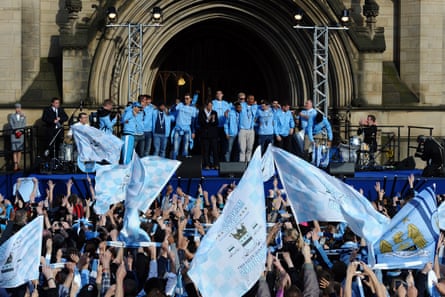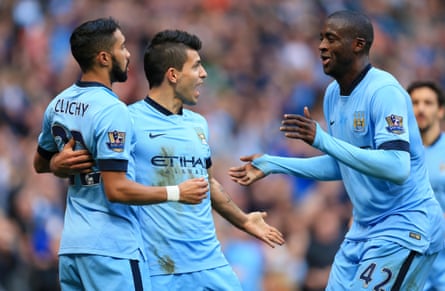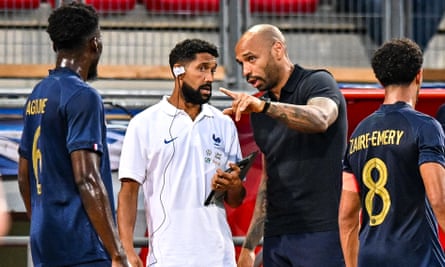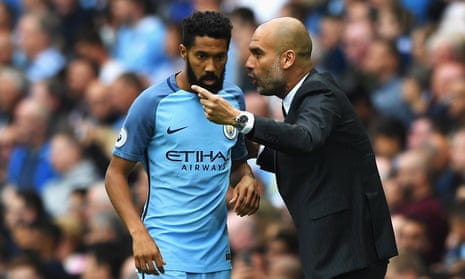I joined Arsenal as an 18-year-old in 2003. By the time I signed for Manchester City in 2011, football had changed. There was more focus on detail. We were starting to see that a player could make a difference with the ball, but make things difficult for his team without the ball. Out of possession, they may not cover enough ground or be placed in the right position.
I was always the type of player who wanted to find out how the team could be better. At City, I learned to enjoy defending. We knew that if we were leading 1-0 with 20 minutes to go, we weren’t going to concede. We had Joleon Lescott, Vincent Kompany, Micah Richards, Pablo Zabaleta and Aleksandar Kolarov. The manager, Roberto Mancini, prepared his defenders by making us work against six or seven players.
He said: “Guys, the way we play football, we count on you as a back four.” He meant that we needed to be able to deal with being outnumbered on transitions. Roberto would explain it like this: “If we want to create opportunities going forward, our best players need the freedom to lose the ball without it being an issue.” He worked on us feeling as comfortable defending against six or seven as when we had to defend against three or four.
His communication was important. If your manager leaves you four against three in transition and doesn’t explain why, you ask questions of them. But if they explain why, then you can more easily accept it. You can actually feel proud that the manager believes so much in you that he wants you to defend like that.
It was a moment where I thought: “Communication is what it means to be a manager.” It didn’t mean that all the players were happy, or agreed, but at least he touched certain players with why he was doing it. I felt so strong, so confident that we were not going to concede. It was a proud moment when we went back to the dressing room with a clean sheet. Now, as a coach myself, I want my players to believe, to trust my word, to feel confident in what I want from them.
In April 2012, Manchester United were eight points clear of City with six games to go. We had a team meeting where Roberto told us: “Guys, I will not lie to you – eight points is a very big gap. But the way we’ve been playing, I am pretty sure that we are going to do it. I’m going to tell the press tomorrow that the title is over. But guys, between us here, we are going to play each game to close that gap and win that trophy. We will do it.”
You can be a great communicator, but you also need a proper gameplan and players with quality. If everybody then believes and follows the leader, you can make things happen. At City, that is what happened in 2012. The end result was fantastic, winning the Premier League in the last moments of the season.

For me, Mancini was a great communicator who knew how to get the best out of his players. But some reacted differently to his words, and there was a bit of a language barrier at times. His English was good, but not amazing. When he was a little bit angry, speaking fast and saying what he felt, he might have used words that he wouldn’t have if his English was perfect. I think, with Roberto, the language barrier could turn a normal conversation into something boiling, such as an incident with Carlos Tevez when we played at Bayern.
That City team had amazing players: David Silva, Yaya Touré, Samir Nasri, Sergio Agüero, Edin Dzeko. We had so many qualities that even when a game was blocked, they could unlock situations individually. It’s not always easy to manage a team with so much quality, because you have to leave some on the bench. That creates some tension within the group, and you need to deal with that. How are you going to manage those people who feel that they deserve to play because they have the quality, because they’ve been working really hard, and yet you decide not to play them?
Roberto was really good with that. I was happy that I often played in the biggest games. When we were playing against a lesser team where we needed to attack more, he would play Kolarov. I sometimes felt that wasn’t fair and that I deserved the chance to be an offensive player in those games.
He told me: “We have two left-backs. You are probably a better defender. You bring us more balance, probably lose less balls and you are composed. But when we need goals and need to attack, then I believe that Kola is better than you. If you look at the calendar, you usually play the games where people watch, because they are the important games.”
It was the truth. All I said back was: “Thank you for the explanation. I will crack on with my job and try to do as good as possible.” Communication in that way is progressive, positive communication.
Roberto left in 2013 and Manuel Pellegrini came in. When you have a vision, a plan, you’ve got to stick with it and I think the City board already had Pep Guardiola in mind. They knew they would get Pep soon, so they decided to go for Pellegrini after Mancini. The club could have gone for any manager but they went for someone close to Pep’s philosophy and who knew the Spanish league. They wanted a manager who would play offensive and whose team would score goals.
If you go for someone like José Mourinho, you know he will want certain players who fit the style that has brought him success. If Pep followed, you then have to change the whole squad because it’s not the same view of football.
That was very clever. City have the money, but the way the club has been run since the moment I signed for them has been exceptional. They think three or four transfer windows ahead. They’re not scared to let their main player go because they know eventually they need to replace him. They prefer to cut the story, bring someone in and keep the machine going.
Pellegrini brought more flowing football. His teams were known for scoring a lot of goals and we won the league with him in 2014. Pellegrini and Roberto had many of the same main players – the likes of Yaya Touré and David Silva – but there was a shift. Kevin De Bruyne came in, and Fernandinho arrived too.
With Pellegrini, we were adventurous going forward. Mancini would tell me: “Get forward, because when David or Samir [Nasri] have the ball I need you to take the full-back with you, so they can go in and combine with Yaya and Agüero and arrive in the box. But I also need you to be there to defend when we lose the ball.” With Pellegrini, it was more flowing, free football. When we won the title with Pellegrini, we scored 102 goals.

My final year at City was Pep Guardiola’s first season at the club. I played more games for him in a season than I did for any City manager. But I have contrasting feelings about that year with Pep. I am grateful for what I learned from him, but I wish it could have been more than one season. He ignited a spark in the way I see football and made me want to learn even more.
When I watch football now, I cannot distance myself from what I’ve seen and what I learned from Pep. All of that, in one word, would be details. Pep is all about the details. However you want to play – no matter your ideas, your vision, your love for a certain way of playing – details will take you there.
As a player, I was always on top of details. I never counted myself as a blessed player. I always had to work hard and be at the top of my game, on and off the field. Pep told me: “Keep on doing detailed things because details will take you up there.” It was amazing to witness this in action.
The people who love analysing games can make books about Pep’s tactics and the way he transforms his team’s formations. For me, though, there were three great examples I witnessed of his focus on details.
First, his rule of two kilos. If you were two kilos over what he considered your top weight, you didn’t train. In football, you always hear managers say: “If you’re overweight, you’re not training.” In the end, if it’s an important player, the rule is pushed under the carpet because they need that player. With Pep, if you were two kilos over the weight you were after finishing the hard work and proper food of pre-season, you did not train. I saw players who didn’t train for two weeks.
Second, in pre-season his fitness coach told me: “The numbers you are recording every training session are amazing.” I said: “Great, it’s one of my main attributes.” And he said: “But you are doing the same numbers as Dani Alves.” At that time, Alves was 33 and I was 31. So I said: “OK, that’s fine.” Then he said, “No, I am talking about Dani Alves from eight years ago, with Pep at Barcelona!”
When you are a manager, you need to delegate. You need to make your staff as important as you are. With that conversation, I realised Pep and his staff were speaking, all together, and noticing all these details. They look at who arrived first at breakfast and what they ate.
They’re not going to tell you to eat differently but if you don’t eat right it tells them that you don’t have the right mindset to perform in their team. They are also looking at who performed in terms of running, who performed in terms of losing the ball. They’re looking at every single department, and want everybody to be on it.
The third example came when we had a 40-second water break after a passing drill, before we had to start with the fitness coach. He was on a different pitch, waiting for all the players to gather round so he could explain the exercise. Pep took me aside during that water break, and started talking to me.
“You know, when you received the ball there, I want you to be able to do that, because if you do that then you will create this over there.” He was so passionate about his explanation, and I was so into it that the time went past the 40-second break. The fitness coach pointed to his watch and shouted: “Pep! It’s my time now, you speak after.” Pep looked at me and said: “OK, go and I’ll speak with you after training.”

Now, we all knew Pep was the main guy, the boss. But right there, in front of everybody, he put his staff on the same level. The message was clear: if you mess around with my staff, it’s like messing around with me.
As a leader you have to be able to delegate, because you can’t do everything. You have to focus on what matters, to focus on details. Details that sometimes, as a manager, you can’t see. In that moment, Pep showed what it is to be a manager. It was beautiful to see.
I couldn’t have asked more from my time at City than to learn from Roberto Mancini, Manuel Pellegrini and then Pep Guardiola. That was a blessing. Now, as I begin my coaching career assisting Thierry Henry with the France Under-21s, the future is very exciting.

Comments (…)
Sign in or create your Guardian account to join the discussion